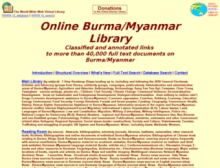Resource information
Mawchi is a township in Northwest Karenni that was once a successful mining town. It was often referred to as 'little England' because of the life style on display there and its accompanying standards of living. Private British business interests developed the mines in Mawchi between the world wars, but the local economy began to decline, with the rest of Burma, with Ne Win’s Burmese Way to Socialism. The economy of Mawchi, and the standard of living for people in the Township, has continued to decline across successive military governments.
The latest and the most severe economic crisis in Mawchi is the result of the regime's 1996 forced relocation campaign. This program led to the total collapse of agricultural production in the area and the subsequent collapse of the rest of the economy. All the villagers from the surrounding areas were forced to move into the town of Mawchi. The cessation of agricultural production brought about a massive increase in the price of food and a large increase in unemployment. Now most people are more or less constantly hungry and spend their days scrounging around looking for food. All the children in the city are engaged in helping their parents obtain food - collecting birds, worms, frogs and insects to eat. Hardly any rice produced gets to market as it is kept for the family to eat and to pay back debts. The small amount of rice that does reach the market, which most cannot afford, is of the lowest quality and fit only for being boiled. This has caused most people to leave the township for Thailand and a number of the cease-fire areas...


